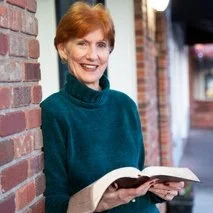Sabbath Rest
Summer Sampler 2025: The Spiritual Disciplines That Form Us
What are spiritual disciplines? And why are they relevant to our lives? Spiritual disciplines are purposeful practices that cultivate a deeper, richer, and more intentional relationship with God and others. They are not simply rituals, but tools for growth, transformation, and living a more Christ-like life. Each week in our Summer Sampler we will be exploring one of these disciplines. Our hope is that you’ll discover one or more that are a fit for you and that you can incorporate into your walk with Jesus.
By Phyllis Bennett
God’s call to rest, to be still and know that he is God, is a calendared event as well as a disposition of the heart. For my husband Dave and me, in addition to our daily quiet times, it is the primary spiritual discipline that has set the sails for our marriage, family life, and ministry. It includes Sabbath rest, commanded and modeled in Genesis 2:2-3, where the pattern of six plus one in the week was established. But it is also nestled against the backdrop of Israel’s yearly festival celebrations, which establish biblical warrant for us to calendar our own vacations and recreation.
Our Almighty God is the only one who has the capacity to never sleep nor slumber (Psalm 121:4). In a culture where busyness is idolized and rest often associated with weakness, valuing God’s gift of rest reminds us to live within God-given boundaries of our own unique callings and ever-changing physical capacities as we age.
We can best value rest, however, when it is backdropped against God’s clear call for us to work
We can best value rest, however, when it is backdropped against God’s clear call for us to work. Os Guinness, in his book The Call, tells the story of a young widow living in Scotland in the 1880s who fell into despair and one dark day went down to the river to drown herself. But watching a young man plowing a field helped her regain a clear sense of purpose. She rose, went forth, and lived a long and productive life.
John 9:4 reminds us why we work: “Work, for the night is coming.” We are kingdom-builders, and God has called us to put our hand to the plow while it is still day. Even Jesus knew the limitations of his earthly calling: “I brought you glory on earth by finishing the work you gave me to do.” (John 17:4)
The Chinese join two characters to form a single pictograph for busyness: heart and killing. Too much work, and something dies inside us. Too much play, however, can become an addiction. The key to the proper balance between the two is understanding scriptural guidelines and obeying the Spirit’s nudges.
What are the benefits of daily, weekly, monthly, and even yearly patterns of rest? If we don’t know “the why” it’s easy to ignore “the what”! Here are some practical reasons that have helped guard our hearts and schedules, giving us permission to make rest a priority.
Sabbath rest: One day in seven we are reminded that our great God is at the center of our universe, not us! In his wisdom, he commands Sabbath rest because he knows we need it. Life begins with him — not us, nor even with just our own families! Including children in Sabbath rest, both in worship and in helping them feel they are a top priority on our days off as well as on our vacations, is so vital to kids growing up loving Jesus.
I held my breath when a Christian leader I greatly respect asked our grown sons if, as kids, they ever felt ignored or pushed aside when we were pastoring our churches. I breathed a sigh of relief to hear each of them say, “Not at all! Mom and Dad always helped us to feel more important than the ministry!”
It’s a proven fact that creativity comes after rest. Archibald Hart in his show-stopper book Adrenaline and Stress says the following about hurry-sickness for the adrenaline addict: “There is now abundant evidence that our most inventive and creative state of mind is at low levels of adrenaline arousal. Contrary to what people believe, it is when we are minimally aroused by adrenaline (after a day off, on vacation, after sleep, in the shower, on a walk, etc.) that we do our most innovative and imaginative thinking.”
Dave and I often remind each other, when writer’s block or similar symptoms set in, to STOP — that creativity will come after rest!
Deuteronomy 5:12-15 gives the third reason to obey the command to rest: for the sake of liberation. Mark Buchanan states in The Rest of God, “You were once slaves. There was once a day you were denied any choice in the matter. Rest? Work? The choice was made for you day in and day out. The point was reinforced with bullwhips. Rest was for the other people, the taskmasters who drove you to work.”
“But what did God do to every last one of the taskmasters, with his mighty hand and his outstretched arm — he drowned them in the Red Sea, never to bother you or whip you into submission again. Don’t revive what God has removed. Don’t place yourself in a yoke that God broke off and tossed off with His own hands.”
Which of these three reasons draws you to your need for rest? What patterns of rest and work do you feel called to reevaluate and adjust, and why?
In closing, I hear the sweet chorus ringing in my heart that my mom used to sing to me (from the hymn “In the Garden”), giving us one final reason to embrace rest as central to life. It’s so simple — let’s not miss it:
“And he walks with me, and he talks with me, and he tells me I am his own. And the joy we share as we tarry there, none other has ever known.”
Enjoy his very presence as you embrace the rest he lovingly provides!
For more about Spiritual Disciplines, check out the Spiritual Disciplines Handbook by Adele Calhoun.
As a retreat speaker, adjunct seminary instructor, and team leader of Inspiring Women to Biblical Excellence, Phyllis Bennett is passionate about the Word of God and the gospel-centered transformation it can bring about in the lives of her audiences and students.
She is married to the love of her life, Dave Bennett, and they have pastored together four churches from “sea to shining sea” before more recently switching to a more global focus for Dave and a more regional focus for Phyllis. Their two married sons and eight grandchildren bring joy, delight, and adventure to their present season of life. They are passionate about staying in shape, eating well, reading broadly, and embracing life with Jesus at the center.



